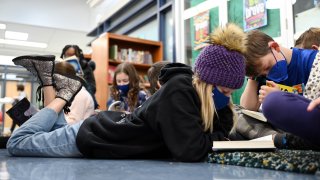
As more school districts across the country vote to ban books, students are taking matters into their own hands.
Joslyn Diffenbaugh, 14, an eighth grader at Kutztown Middle School in Pennsylvania, has always been an avid reader. Prior to the 2021-2022 school year, she told her mom she wanted to start a book club — just another excuse to haul her latest read around and discuss it with her peers.
Then she started hearing about books being banned in various states, and watched as her parents started receiving mailers from candidates running for the local school board calling for books to be banned in her school district, too. Her plans shifted, and the Banned Book Club was born.
"I have a really big love for books," Joslyn tells TODAY Parents. "And I really just want to let people have access to all these books and really see why they are trying to ban them."
We've got the news you need to know to start your day. Sign up for the First & 4Most morning newsletter — delivered to your inbox daily. Sign up here.
About 15 students attend the book club — the youngest member is in seventh grade and the oldest is a junior in high school. Around 300 students attend Kutztown middle school, and nearly 440 attend the high school.
“We’re focusing on the newer banned books, especially books dealing with race and LGBTQ+ issues,” Joslyn says. “But we’re also reading historically banned books, because we want to see why books have been banned in the past compared to why these books are now being banned today.”
Related: School district bans "The Bluest Eye"
U.S. & World
The day's top national and international news.
While there has been increased pressure to ban books by parents and specific board members in the district — including the book “I Am Jazz,” based on the real life of author Jazz Jennings, and “Gender Queer: A Memoir,” by Maia Kobabe — on Jan. 18, the Kutztown School Board voted 5-4 to keep the challenged books in circulation at the district’s high school.
Additional book-related measures also failed, including one to "require a parental signature to check out the book and another to censor specific pages of the book containing graphic illustrations,” according to original reporting by Reading Eagle.
Joslyn says the book club recently finished "Animal Farm" by George Orwell, and are beginning to start "The Hate U Give" by Angie Thomas. After its release in 2017, "The Hate U Give" was the American Library Association’s eighth most banned book.
“‘The Hate U Give’ is really inspiring me to read more,” Bridget Johnson, 13, who attends the book club, tells TODAY. (All the children featured in this story spoke to TODAY with their parents' permission.) Bridget says she wasn’t really into reading for fun before attending the club, but now loves to learn about symbolism and enjoys the conversations the club inspires.
"I don't like that students are trying to be controlled like this," she says. "Especially if the book isn't actually harmful to anyone. It's pointless."
"It's frustrating because a lot of the adults are saying, 'Well, you can't read this,' but yet they've never asked any teenagers how we feel about these topics," Joslyn adds. "They're telling us how to feel, not asking us."
Younger students are taking action, too
In Missouri, the Wentzville School Board voted 4-3 to ban the “The Bluest Eye,” by Toni Morrison, prompting 7-year-old Peighton Gallagher to send her school board a letter, with the help of her mom.
"She loves to read," Peighton's mom, Rebecca Gallagher, tells TODAY. "So when she overheard my mother and I talking about what was going on, and that a book was being removed, she decided that she was going to write the school board because she knew that I had done the same. I email quite frequently."
Gallagher says she didn't tell Peighton specifically why the book was banned — just that "there were some topics that made people uncomfortable, and so some parents didn’t want their children reading those topics."
"I helped her, of course," she adds. "But she wrote in there that she didn't feel books should be removed in the library. That if there were things that parents didn't want their children to read, that they could request that their child not read the book."
Several administrative staff members wrote back to Peighton, thanking her for taking the time to send in her thoughts and applauding her for self-advocacy at such a young age.
"I'm so grateful that you shared your thoughts and ideas," one school board member wrote back. "That's quite impressive for a 2nd grader!"
The board voted to ban “The Bluest Eye” against the recommendation of a review committee tasked with considering requests to ban or censor books. The committee, made up of parents, teachers, librarians, and one board member who voted in favor of pulling the book, recommended the book be retained.
The board also voted to remove “All Boys Aren’t Blue” by George M. Johnson, “Fun Home: A Family Tragicomic” by Alison Bechdel, and “Heavy: An American Memoir," by Kiese Laymon from school library shelves, and without the review board's consideration.
Gallagher says that while she is proud of her daughter and the other students who are taking action, she wishes they didn't feel obligated to take a stand.
"I actually attended the school board meeting where this was discussed," Gallagher said. "And we actually had a small group of high school students present... you could tell they are upset about the book being removed. They shouldn't have to be experiencing this."
Parents respond to student-led efforts
John Kaelin, a parent in the Wentzville school district and father of two, says he’s running for the school board in this year’s upcoming election.
“Our children deserve board leadership that they can look up to,” Kaelin tells TODAY. “And so we as parents have to model that behavior. The ability to think critically and to separate information from misinformation. If our board isn’t going to do that, how can we ask our students to be taught to do that in schools?”
While Kaelin’s children, ages 8 and 11, have not been affected by the recent wave of banned books, he says he wants to ensure they won’t be in the future.
“We need to lead today so they learn how to lead tomorrow,” Kaelin said. “The kids who are starting these banned books clubs and who are advocating for themselves have those parents who have modeled that. And that does give me hope.”
Heather Fleming, a mom of three living in Missouri and founder of two non-profit community organizations, is helping to get recently banned books in the hands of students who want to read them.
“On Friday, we connected with another Black-owned bookstore here in St. Louis called Eye See Me,” Fleming tells TODAY. “We created this program to make sure that we can send a book to anyone who requests one.”
As of Sunday morning, the Banned Book program received over $12,500 in donations and over 500 requests for books.
Fleming says she has received personal attacks, harassment, and threats, while Rebecca Gallagher says there are parents in her school district who try to intimidate students who oppose books being banned, going so far as intimidating them online.
“In our district, the group of parents that is challenging these books are also taking photos of these kids in these meetings and mocking them online,” Gallagher explains. “It’s so inappropriate. But the students stand firm in what they believe.”
Students say they'll continue to speak up
Bridget, one of the Kutztown banned book club attendees, says she'll continue to speak up, not just for herself but for her peers.
"Just hearing about (books being banned) is making kids feel unsafe in their school," she says. "Like they can't talk to people in the school, or that they just can't be openly... anything."
Joslyn agrees, and believes that more books are going to be banned in the future — another reason why it's important to her that the book club continues to read and meet.
"It's scary seeing all these books being banned, especially for people they may be representing," she says. "It's also a lot of history that is being banned or censored, too. And history is one of the best ways to learn and to make sure that you can make better decisions in the future."
Jennifer Lau, a Kutztown alumni and mom of two, ages 9 and 11, says as a LGBTQ+ parent she fears what both students and parents of the LGBTQ+ community are hearing when books centering their experiences are banned.
"It's been very hard for us to see these bans coming into place, especially coming into books that are around LGBT issues," Lau tells TODAY. "We've just felt very uncomfortable and that we need to closet ourselves more and not be as open in our community."
Both Joslyn and Bridget say many of their LGBTQ+ peers and friends are also afraid, especially those who have not yet come out to their parents, family members and peers. Lau says she can sympathize.
"That was one of the reasons why I moved away," she says. "I didn't live here for a very long time and just came back about eight years ago. I thought that maybe things had changed... but now it's very disappointing and saddening to me that it has not changed at all."
Now she says she worries that her family will have to move, or that they'll have to pull her two children from the public school system in order to protect them.
"There was a letter that was sent to our home, along with a lot of other parents in our district, that was targeting the book 'I am Jazz,'" she explains. "My older son did read the letter, and it was very upsetting."
Both Joslyn and Bridget remain hopeful that their efforts — as well as the efforts and support of other students, parents, teachers, and administrators — will change things for the better.
"Our generation is very accepting of people of different races and who identify differently," Joslyn says.
"I'm hopeful for the future, for sure," adds Bridget. "This generation — we're growing so much. Things aren't better yet, but clubs like these are starting."
This story first appeared on TODAY.com. More from TODAY:



